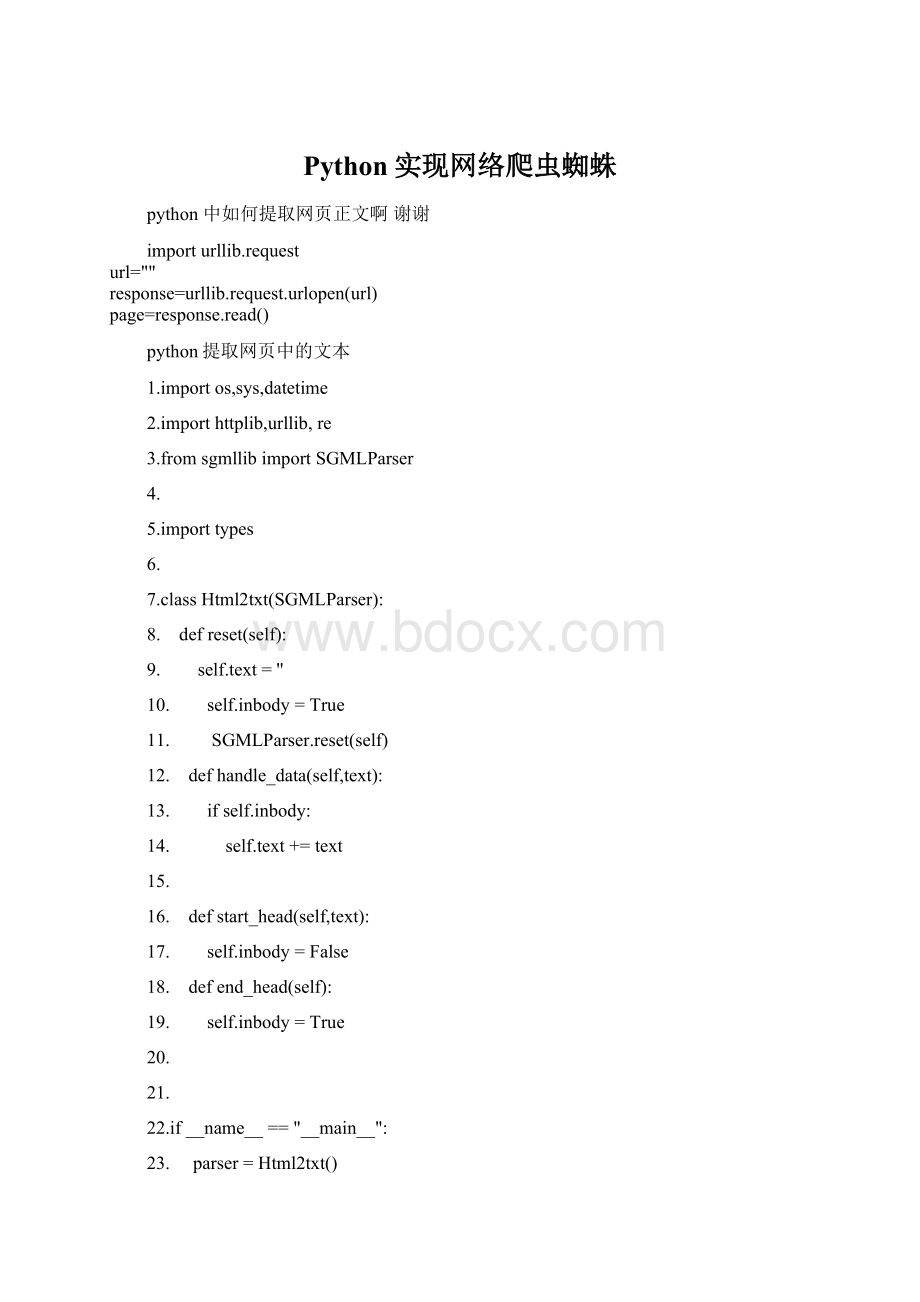Python实现网络爬虫蜘蛛Word下载.docx
《Python实现网络爬虫蜘蛛Word下载.docx》由会员分享,可在线阅读,更多相关《Python实现网络爬虫蜘蛛Word下载.docx(16页珍藏版)》请在冰豆网上搜索。

10.
self.inbody=True
11.
SGMLParser.reset(self)
12.
defhandle_data(self,text):
13.
ifself.inbody:
14.
self.text+=text
15.
16.
defstart_head(self,text):
17.
self.inbody=False
18.
defend_head(self):
19.
20.
21.
22.if__name__=="
__main__"
:
23.
parser=Html2txt()
24.
parser.feed(urllib.urlopen("
).read())
25.
parser.close()
26.
printparser.text.strip()
python下载网页
importhttplib
conn=httplib.HTTPConnection("
)
conn.request("
GET"
"
/index.html"
r1=conn.getresponse()
printr1.status,r1.reason
data=r1.read()
printdata
conn.close
用python下载网页,超级简单!
fromurllibimporturlopen
webdata=urlopen("
).read()
printwebdata
深入python里面有
python
下载网页内容,用python的pycurl模块实现
1.用python下载网页内容还是很不错的,之前是使用urllib模块实验的,但听说有pycurl这个模块,而且比urllib好,所以尝试下,废话不说,以下是代码
2.
3.
4.#!
/usr/bin/envpython
5.#-*-coding:
utf-8-*-
6.importStringIO
7.importpycurl
8.
9.defwrite):
f=open(x,'
w'
f.write(fstr)
f.close
10.
1.html=StringIO.StringIO()
2.c=pycurl.Curl()
3.myurl='
5.c.setopt(pycurl.URL,myurl)
7.#写的回调
8.c.setopt(pycurl.WRITEFUNCTION,html.write)
10.c.setopt(pycurl.FOLLOWLOCATION,1)
12.#最大重定向次数,可以预防重定向陷阱
13.c.setopt(pycurl.MAXREDIRS,5)
15.#连接超时设置
16.c.setopt(pycurl.CONNECTTIMEOUT,60)
17.c.setopt(pycurl.TIMEOUT,300)
19.#模拟浏览器
20.c.setopt(pycurl.USERAGENT,"
Mozilla/4.0(compatible;
MSIE6.0;
WindowsNT5.1;
SV1;
.NETCLR1.1.4322)"
22.
24.#访问,阻塞到访问结束
25.c.perform()
27.#打印出200(HTTP状态码,可以不需要)
28.printc.getinfo(pycurl.HTTP_CODE)
29.
30.#输出网页的内容
31.printhtml.getvalue()
32.#保存成down.txt文件
33.write(),"
down.txt"
的pycurl模块的安装可以到这里去找.
不同系统使用不同版本,自己看看
总结下,Python下载网页的几种方法
1
fd=urllib2.urlopen(url_link)
data=fd.read()
这是最简洁的一种,当然也是Get的方法
2
通过GET的方法
defGetHtmlSource(url):
try:
htmSource='
req=urllib2.Request(url)
fd=urllib2.urlopen(req,"
while1:
data=fd.read(1024)
ifnotlen(data):
break
htmSource+=data
fd.close()
delfd
delreq
htmSource=htmSource.decode('
cp936'
htmSource=formatStr(htmSource)
returnhtmSource
exceptsocket.error,err:
str_err="
%s"
%err
return"
3
通过GET的方法
defGetHtmlSource_Get(htmurl):
htmSource="
urlx=httplib.urlsplit(htmurl)
conn=httplib.HTTPConnection(loc)
conn.connect()
conn.putrequest("
htmurl,None)
conn.putheader("
Content-Length"
0)
Connection"
"
close"
conn.endheaders()
res=conn.getresponse()
htmSource=res.read()
exceptException(),err:
trackback.print_exec()
conn.close()
通过POST的方法
defGetHtmlSource_Post(getString):
url=httplib.urlsplit("
POST"
/sipo/zljs/hyjs-jieguo.jsp"
len(getString))
Content-Type"
application/x-"
Keep-Alive"
conn.send(getString)
f=conn.getresponse()
ifnotf:
raisesocket.error,"
timedout"
htmSource=f.read()
f.close()
本文来自CSDN博客,转载请标明出处:
Django+python+BeautifulSoup组合的垂直搜索爬虫
使用python+BeautifulSoup完成爬虫抓取特定数据的工作,并使用Django搭建一个管理平台,用来协调抓取工作。
因为自己很喜欢Djangoadmin后台,所以这次用这个后台对抓取到的链接进行管理,使我的爬虫可以应对各种后期的需求。
比如分时段抓取,定期的对已经抓取的地址重新抓取。
数据库是用python自带的sqlite3,所以很方便。
这几天正好在做一个电影推荐系统,需要些电影数据。
本文的例子是对豆瓣电影抓取特定的数据。
第一步:
建立Django模型
模仿nutch的爬虫思路,这里简化了。
每次抓取任务开始先从数据库里找到未保存的(is_save=False)的链接,放到抓取链表里。
你也可以根据自己的需求去过滤链接。
python代码:
viewplaincopytoclipboardprint?
01.classCrawl_URL(models.Model):
02.url=models.URLField('
抓取地址'
max_length=100,unique=True)
03.weight=models.SmallIntegerField('
抓取深度'
default=0)#抓取深度起始1
04.is_save=models.BooleanField('
是否已保存'
default=False)#
05.date=models.DateTimeField('
保存时间'
auto_now_add=True,blank=True,null=True)
06.def__unicode__(self):
07.returnself.url
classCrawl_URL(models.Model):
url=models.URLField('
max_length=100,unique=True)
weight=models.SmallIntegerField('
default=0)#抓取深度起始1
is_save=models.BooleanField('
default=False)#
date=models.DateTimeField('
auto_now_add=True,blank=True,null=True)
def__unicode__(self):
returnself.url
然后生